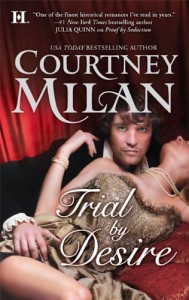 As I mentioned when last I wonked here, Courtney Milan‘s historicals feature a number of wonktastic folks (heroes in particular) so it was difficult to choose. But in the end I had to go for Ned Carhart of Trial by Desire. Because really, what’s wonkier than a hero trying to cope with manic-depression long before a diagnosis existed for such a condition (much less medication)?
As I mentioned when last I wonked here, Courtney Milan‘s historicals feature a number of wonktastic folks (heroes in particular) so it was difficult to choose. But in the end I had to go for Ned Carhart of Trial by Desire. Because really, what’s wonkier than a hero trying to cope with manic-depression long before a diagnosis existed for such a condition (much less medication)?
Lest you fear, tipping the hand and revealing Ned’s problem here isn’t a spoiler (even the author says so!). We actually meet him in an earlier book, Proof by Seduction, and it’s pretty clear from the get-go that he has some psychological issues. In the first chapter of that earlier book we learn that he’s been seeing a fortune-teller for two years, a relationship that begins with his asking her, “Is there any reason I shouldn’t kill myself?” The woman (a fabulous and not unwonky heroine in her own right) becomes, in effect, his therapist. She gives him hope, bolsters him through suicidal depression, and by the end of the book Ned is in a better place mentally than he has been for some time.
But by the opening of Trial by Desire, Ned is in dire emotional straits once more, and ends up leaving his wife of only a few months (not the fortune-teller, by the way) to hare off to China for three years…to prove himself. And to get himself under control. This is a big thing with him, throughout the book, as we’ll learn.
When he finally comes back to England and attempts to resume some sort of relationship with his estranged wife Kate, Ned’s on the verge of a manic period; we learn his coping strategy is to exhaust himself with physical activity unbecoming a man of his social station (in this case, pitching hay):
Over the past few years he’d learned he could contain the restiveness, his simple inability to just stop. All he had to do was channel that excess energy into physical tasks. The more mundane, the more repetitive, the greater the strain on his muscles, the better it worked.
Ned’s strategy isn’t just a response to his manic phases, though. He’s storing up nuts of energy for his next inevitable emotional winter, and part of the character arc we don’t see first-hand—because it happens during the three-year period when he’s in China, alone—involves his learning the need to do this, the hard way. For him, control issues are a good thing, something he’s struggled to learn, and to use to his advantage.
[…] his muscles burned and he wanted nothing more than to set down the pitchfork and leave the work to the men Plum would undoubtedly send.
But he didn’t. Because not only did this bleed off all that extra intensity, this was good practice. while there were days like today, when he felt vigorous and invincible, there also came times when he wanted nothing more than to simply come to a halt.
Those were the poles of his life: too much energy, almost uncontainable, followed by too little. When the next pole came riding ’round, he’d be ready for it again.
For now, though, he pitched hay.
The fact that it makes him extra muscular and hawt is just gravy (although kudos to Ms. Milan for that gravy, because I do dislike a historical hero who’s built like a gym rat for no good reason anyone can see). What I particularly like about this scene only 50 some-odd pages into the book is the clever way it foreshadows the problem with Ned and intimacy. This is a guy, we can already tell, who is all about control, and about denying himself. Sleeping in a cold room so he doesn’t get too soft. The fact that this also means denying his wife and leaving her to sleep alone is incidental.
At this point you may be thinking that’s a common enough trope. The Wounded Hero, who can’t allow himself to love, finally breaking free from his icy shell and living Happily Ever After because of the Right Woman? Nuh-uh. Because, and this is why it’s wonk, Ms. Milan does not pull this punch. Ned’s condition isn’t going to be cured by love, because that isn’t how manic-depression works. And I adore her for that. I adore her for the fact that in the epilogue, set six months after the last chapter of the book, we learn that Ned has already been through some more manic times and at least one month of depression, and those aren’t fun times, and the couple has had to deal with that.
On Courtney Milan’s website, she discusses this book’s WIP code name, “Dragon Slayer,” and offers a quote that, for me, sums up what makes Ned such a different kind of hero:
“In the stories,” he said, his voice a dark rasp against her skin, “in the stories, the heroine always slays the dragon and lops off his head. The villagers rejoice and build a bonfire, and darkness never again falls on the land.”
She could feel his hands at her side, warm and powerful against the heat of her skin.
“But those,” Ned continued, “are only fairy stories. In reality…”
He smiled at her in the mirror, a lopsided smile. There was something faintly wicked about that expression, as if he were about to impart to her a great secret, one that had been closely-guarded by a centuries-old society. She swayed unwittingly against him.
“In reality,” he whispered, “the dragons never die, and the big sword-wielding buffoons in unwieldy armor cannot slay them. Real heroes tame their dragons.”
This is Ned’s challenge, his difference, his font of wonk. He knows he has a black dog, a dragon, and it will always be with him. He can never slay it (again, because love can do many things but it cannot cure mental illness). Darkness will fall upon the land, again and again. And since this is a romance, that means he and his heroine just have to learn to deal with that recurring darkness, as part of the price for the moments of HEA they’ll be able to find when Ned isn’t battling one extreme or the other. These truths, to me, don’t make Ned any less heroic; they make him more so, because the battle he fights will be a lifelong one, a baseline battle that will always be there in addition to whatever else he decides to take on. And it will be a life full of wonk.
Bonus legal nerdage: pages at the end of the book in which Milan geeks for a bit about Victorian era summary trials. Oh yeah, baby.
Read more about Trial by Desire on Courtney Milan’s website.
 Read about the Silver Ribbon Campaign for the Brain; the Silver Ribbon Coalition is an advocacy group that promotes public awareness of the need for emotional, social, governmental, and research support of individuals with brain disorders and disabilities (including bipolar disorder, depression, and a host of other conditions). Note: another group that has more recently started using a silver ribbon motif is the “Trust Women” reproductive rights campaign.
Read about the Silver Ribbon Campaign for the Brain; the Silver Ribbon Coalition is an advocacy group that promotes public awareness of the need for emotional, social, governmental, and research support of individuals with brain disorders and disabilities (including bipolar disorder, depression, and a host of other conditions). Note: another group that has more recently started using a silver ribbon motif is the “Trust Women” reproductive rights campaign.























This book sounds awesome. I appreciate it when romance novelists set hard limits in terms of what love can and cannot do. Love is good for many things. It can be a great catalyst for personal growth. But no, it definitely can’t cure mental illness. It’s awesome that Milan wrote a hero whose mental illness neither disqualifies him for love nor gets magically healed by it.
I have a big thing about the love-does-not-cure-crazy issue. Don’t even get me started on Benny & Joon, or that one Richard Dreyfuss movie with the “autistic” kid. So yeah, this one got extra elebenty million plus bonus happy points from me on that basis alone. Also (and at over 1100 words I felt I was out of space to address this in the post) the heroine has some side-wonk of her own going on. She’s running an underground railroad for battered wives, sorta, and that isn’t the easiest thing to accomplish. When the hubs shows back up, she has this kind of, “Oh, FFS, really? NOW?” reaction that’s pure awesome. There’s even a wonky, really bad-tempered, abused horse in place of an adorable plot moppet. He remains firmly bad-tempered and wonky and dangerous even though Ned puts him out to pasture and feeds him peppermints.
I have never heard the phrase plot moppet, but it fills an important gap for me. I’m in a run of books right now with plot moppets. (Best part is that Fire just autcorrected that to “plot nippers.”)
I, too, prefer a dose of realism when it comes to love’s possibilities and limits. Although I also don’t always love reading about depression–have a tendency to overidentify. Still, wWill bump this one to top of scary TBR pile.
She really pulls it out. It’s realistic but not disheartening. You’re left feeling not “dang, that’s gonna suck for them”, but rather “They can DO it!”
Gratuitously cute non-plot essential animals, children, etc. = plot moppets. We’ve all written them, of course…but we all know we shouldn’t. I like a good anti-moppet, though.